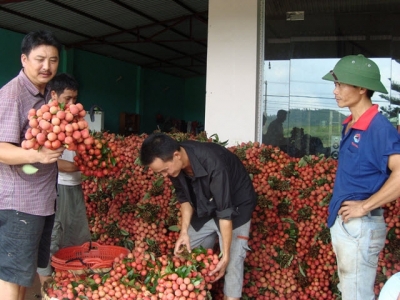Bac Giang strictly supervises litchi production

To facilitate litchi selling and meet the export demand, Luc Ngan and Tan Yen districts and competent authorities of Bac Giang province will focus on instructing and strictly supervising local farmers’ application of VietGAP, GlobalGAP standards, ensuring their products eligible to get stamps of origin.
Traders buy litchi in Bien Son commune (Luc Ngan). File Photo.
With positive signals on a bumper litchi crop, the districts and relevant agencies are taking a number of measures to assist the local farmers in marking the stamps of origin to satisfy requirements of foreign markets, including China. The stamps allow customers to easily trace the products’ origin and quality.
Dang Van Tang from the provincial Department of Agriculture and Rural Development said for litchi to be marked with stamps of origin, the growers must strictly comply with the VietGAP and GlobalGAP procedures to ensure the quality and safety of the fruits. They must prune the trees’ branches and use fertilizers as instructed shortly after harvesting. They also have to carefully record the caring process, an element enabling the customers to trace the litchi’s origin.
According to the Bac Giang Department of Agriculture and Rural Development, this year, a bumper litchi harvest is forecast, with the total yield estimated at 180,000 tonnes. In particular, Luc Ngan district is projected to produce 90,000 tonnes, doubling that of last year, and Tan Yen district 15,000 tonnes.
Litchi is only marked with the stamps of origin after the provincial Department of Agriculture and Rural Development takes a sample for testing and verifies that the residue of pesticides does not exceed the limits.
Since the beginning of the season, the districts and the agricultural department have provided farmers with training on the VietGAP and GlobalGAP procedures and regularly examined and monitored the application of these practices in litchi farms.
In Luc Ngan district, the VietGAP and Global GAP are applied across over 11,000 hectares of litchi, accounting for more than 70 percent of the total area. The records of the litchi caring will be checked by authorities every 1-2 weeks so necessary changes can be made to the procedure.
According to Chairman of the People’s Committee of Hong Giang commune Bui Huy Tinh, the commune has assigned agricultural officers to regularly examine VietGAP litchi areas. The officers are responsible for prompting farmers who failed to apply the procedures to make proper adjustments. In addition, members of the local litchi cooperatives have also checked each other.
A representative from the Hong Xuan cooperative in Hong Giang commune said the cooperative has requested its members to sign a commitment to strictly applying the VietGAP and GlobalGAP procedures. It has also set up two inspection teams that are tasked to examine litchi farms every 7-10 days.
“I divided my farm into three separate areas for easier care. My family now applies the GlobalGAP standards with detail records made for each area to track the times when fertilizers and pesticides are used,” Pham Van Tu, a member of the cooperative who owns over one hectare of litchi in Ngot village. Only authorized pesticides are used, he added.
Farmers in Phuc Hoa commune (Tan Yen) take care of litchi in line with VietGAP standards.
As in Luc Ngan, this year, Tan Yen district has directed its specialised department to guide all communes to apply the VietGAP process in lychee cultivation. In addition to renewing VietGAP certification for 108 hectares from previous years, the district has supported the certification of 100 more hectares. Communes with early ripen lychee plantations, like Phuc Hoa, Tan Trung, Hop Duc, Cao Thuong, Lien Son, are assigned to guide and supervise their farmers’ production, ensuring their products are eligible to be labeled with origin tracing stamps. Tan Yen considers the work one of the criteria for assessing and ranking local leaders’ working performance.
Not only supervising litchi caring process, Luc Ngan district has also allocated its budget to fund 50 percent of the labeling cost for all litchi cooperatives and businesses. Nguyen Thanh Binh, Chairman of the Luc Ngan People's Committee, said that the district requires cooperatives and companies to take charge for strict management of their subsidized products, with stamps appearing only on batches meeting the VietGAP or GlobalGAP standards. At present, the locality is working with the VNPT Bac Giang to set up common stamp templates and packaging specifications. The collaboration also aims at establishing an online diary for the litchi care, helping farmers better cultivate the tree and their customers monitor their purchases via smart phones. Tan Yen district, meanwhile, sponsors 100 percent the cost of litchi labeling and packaging for export.
Related news
 Đà Lạt flower growers need help: experts
Đà Lạt flower growers need help: experts Around 300 million flowers from Đà Lạt are exported to markets such as Japan, South Korea and China every year
 Vietnam, China businesses partner in watermelon consumption
Vietnam, China businesses partner in watermelon consumption Nearly 100 Vietnam and China businesses have signed a cooperation deal to sell water melon and some other special farm produce from the central province
 Hi-tech fruit cultivation area built in Luc Ngan district
Hi-tech fruit cultivation area built in Luc Ngan district Building hi-tech fruit cultivation area aims at increasing the trademark value for fruit orchards in Luc Ngan district to meet the markets’ fastidious demand.